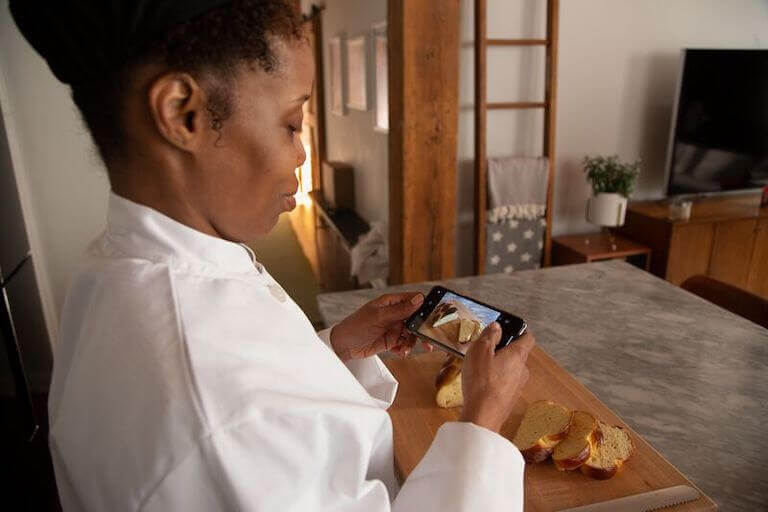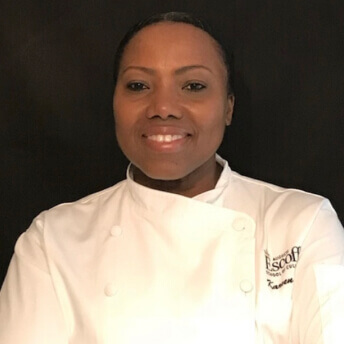Perhaps if you’re reading this, you’re a seasoned chef or hospitality pro with the chops to keep a restaurant afloat…and you’ve fully committed yourself to your culinary dream. The question is—do you need more to truly become “successful” in the industry? Does building a personal brand actually move the needle in the land of opportunities?
In today’s ever-evolving restaurant and hospitality industry, cultivating a powerful social identity may support several areas of your business. Let’s explore how to build a personal brand as a culinarian and how it can amplify your sphere of social influence.
What Is a Personal Brand in the Culinary World?
Before we dive into how a personal brand can benefit your culinary career, let’s break down what a “personal brand” actually means.
For many years, branding was left for big companies and expert consultants to figure out—usually denoted in a guide, handbook, or manifesto. But now with a litany of social media platforms, everyday people, including chefs, can digitally build a personal brand to foster a community of loyal followers.

Culinary student filming content for social media posts as part of personal branding.
As a chef, your brand might encompass your core values, ethos, guest service standards, skills, and how you uniquely contribute to the culinary community, in relation to other chefs. For example, maybe your sole purpose is to partner with micro farmers to deliver farm-fresh, sustainable dishes to guests while supporting the local economy. If this is your focus, how can you accurately convey this mission through brand messaging and distinct creative assets? We’ll elaborate on this a bit later, but no matter what type of personal brand you build, it’s critical to keep everything as succinct as possible, so your audience knows what to expect from you.
“Your personal brand is your mise en place–a collection of your distinct experiences brought together to set you apart from the rest. It allows you to acknowledge your best features and bring them together to elevate you as a brand. I call this process ‘simmering,’ as it builds upon the texture and flavor of who you are. Recognizing your talents and strengths is key to knowing your value and what you bring to the table–no pun intended! With the use of marketing and other platforms such as social media you can now, ‘plate up’ and present your personal brand to the public. Remember, your individuality is your gift to the world!”*
Chef Kareen Linton, Escoffier Chef Instructor, CEO of A Dash of Coco, LLC, and GLEAM Network Mentor
How Personal Branding Can Benefit Your Culinary Career
When you come to the table with a cohesive and compelling personal brand, you can quickly build, quite possibly, the two most important factors in the restaurant and hospitality industry—trust and reputation. In today’s world of social media, future restaurant guests might peruse online to check out the general “vibe” of the restaurant, scan reviews, and even visit a chef’s social media profile to get a pulse on their reputation.
According to Entrepreneur, “65% see online search as the most trusted source of information about people and companies.” So if your personal branding is compelling, it could be the deciding factor in booking a reservation. Naturally, trust and reputation are two major benefits of building a personal brand, but let’s unpack a few more.

Stand Out to Future Employers and Partners
Did you know that according to the U.S. Bureau of Labor Statistics, the employment rate of chefs and head cooks is expected to grow 15% from now until 2031? Since this rate is much faster than other occupations out there, that means the competition is likely much more fierce.
So how do you stand out from the crowd? One way is through building a personal brand.
Along with delivering a superior resume and nailing your interview, most employers could also visit your website and social platforms to see what type of reputation you’ve built. Will your online presence bolster or tarnish their reputation? Is it a smart financial decision for them to hire you? Your public brand could impact that final decision. Keep in mind, that along with employers, other chefs you may meet at networking events, work colleagues, or future business partners will likely Google your name as well.
Advance in Your Career
Of course, when it comes to getting a promotion in the culinary industry, your overall performance and skill set will likely be evaluated. However, more prestigious roles like “executive chef” can likely come with greater public visibility and responsibilities. For this reason alone, employers might want to ensure that the individual up for a promotion maintains a reputable presence online, that aligns with the restaurant’s overarching values. Think about it–as a chef, you quickly become a label on a product, which in this case, happens to be a restaurant or hospitality establishment.
Access to Entrepreneurial Ventures
When you are confident in your personal brand and identity, it’s much easier to “pitch” new business ideas and get buy-in from other decision-makers. Investors will likely want to back a culinarian who clearly knows their value proposition and skill set.
For example, let’s say one of your goals is to author a cookbook. Along with presenting an exceptional concept, you’ll likely need to pitch it to a publisher. But before they offer you a deal, they may likely check to see if you’ve built a fleshed-out personal brand that supports your book concept and if there are any discrepancies.
This might seem slightly daunting as a new chef, which is why getting a solid education can help. For example, students enrolled in Escoffier’s Food Entrepreneurship program can take a dive into core business concepts, as well as best marketing and promotion practices, to support future aspirations like this.
Build a Personal Brand: Practical Tips
Building a personal brand from the ground up doesn’t need to be overwhelming! It’s usually best to tackle one step at a time. Here are four tips to help get you started:
1. Articulate Your Story & What You Stand For
Carve out some time to do a bit of self-reflection and jot down what makes you authentically you!
- When did your passion for culinary arts begin?
- Who are your mentors?
- What type of education or skill set do you possess?
- What are your culinary interests and hobbies?
- What is your creative style and communication type?
- What key attributes describe you?
2. Build a Personal Brand Guide
Start a simple one-page document you can reference when creating your website or social media content. This could include the following:
- Brand personality
- Your personal mission statement
- Tone of voice
- Desired color palette and font
3. Post on Social Media
Along with a website or portfolio, you might want to consider which social platforms to post on (ie: Instagram, Facebook, TikTok) and formulate a consistent posting schedule.
Types of content might include:
- Behind the scenes at your restaurant, charity, or fundraising event
- Favorite dishes
- Recipe reels
- Cooking tutorials
- Press interviews
- Customer reviews
4. Remain Consistent
If you want to build a rock-solid personal brand, it’s best to remain consistent—which is why a personal brand guide can really help! Any platform or document with your name inscribed on it should be congruous. This includes all social media platforms, your website, and your resume too.
When you’re intentional about your personal brand, this can speak volumes to future employers and partners. It can mean that building trust and bolstering your reputation matters and you’ve put extra thought into these critical details.
Cultivate a Personal Brand for Your Future
There’s a difference between the chef who enters the kitchen to just fulfill their duties and one who does this, plus goes above and beyond to build a personal brand. Choosing to establish a brand that underscores your authentic truth could give you a leg up on your competitors and access to a plethora of business opportunities.
To explore how to present yourself as a chef and take the next step in your educational journey, contact our admissions department to get started.
Ready to read more articles similar to this one? Check out these ones next:
- 13 Great Careers in the Food Industry
- How Professional Chefs Keep Up With Cooking Trends
- How to Prepare for an Executive Chef Interview
*Information may not reflect every student’s experience. Results and outcomes may be based on several factors, such as geographical region or previous experience.

 “Your personal brand is your mise en place–a collection of your distinct experiences brought together to set you apart from the rest. It allows you to acknowledge your best features and bring them together to elevate you as a brand. I call this process ‘simmering,’ as it builds upon the texture and flavor of who you are. Recognizing your talents and strengths is key to knowing your value and what you bring to the table–no pun intended! With the use of marketing and other platforms such as social media you can now, ‘plate up’ and present your personal brand to the public. Remember, your individuality is your gift to the world!”*
“Your personal brand is your mise en place–a collection of your distinct experiences brought together to set you apart from the rest. It allows you to acknowledge your best features and bring them together to elevate you as a brand. I call this process ‘simmering,’ as it builds upon the texture and flavor of who you are. Recognizing your talents and strengths is key to knowing your value and what you bring to the table–no pun intended! With the use of marketing and other platforms such as social media you can now, ‘plate up’ and present your personal brand to the public. Remember, your individuality is your gift to the world!”*